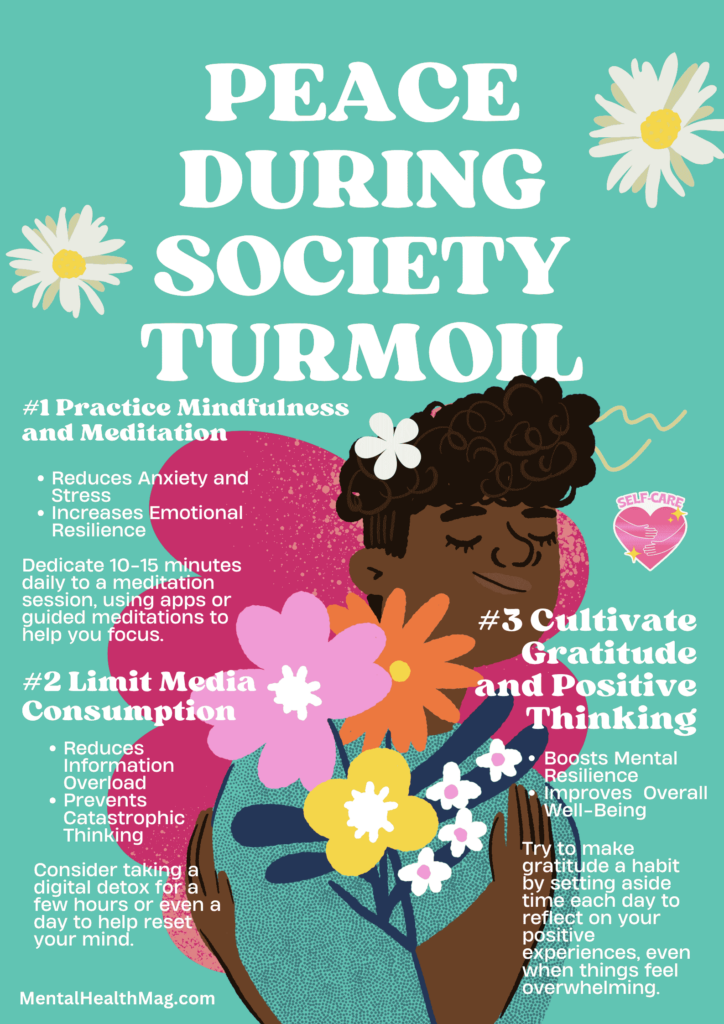In today’s world, it feels like there’s always a new headline, a new crisis, or a shift in societal norms that can disrupt our peace of mind. Whether it’s political upheaval, economic instability, or global health concerns, macro events in society can have a significant impact on our mental well-being. However, the key to maintaining inner peace during such times isn’t about controlling external circumstances—it’s about learning how to manage our reactions and perceptions. In this article, we’ll explore strategies for staying calm and grounded, despite the turbulence in the world around us.

1️⃣ Practice Mindfulness and Meditation 🧘♂️
One of the most effective ways to maintain peace during times of societal unrest is through mindfulness and meditation. These practices help you stay present in the moment, focusing on your breath and bodily sensations rather than getting caught up in the stress of current events. Mindfulness is about observing your thoughts and feelings without judgment, which allows you to break the cycle of reacting to stress.
Why It’s Crucial:
- Reduces Anxiety and Stress: When you focus on the present moment rather than worrying about the future or dwelling on the past, it helps to lower anxiety levels. Meditation can also reduce cortisol, the body’s primary stress hormone, which helps prevent the physical toll that stress can take on your body.
- Increases Emotional Resilience: Practicing mindfulness makes you less reactive to external stressors. Instead of getting swept up in the chaos, you can respond more calmly and thoughtfully to the situations around you.
What to Do:
- Start with deep breathing exercises to ground yourself when you feel overwhelmed.
- Dedicate 10-15 minutes daily to a meditation session, using apps or guided meditations to help you focus.
- Incorporate mindfulness into your day by taking brief moments to pause and check in with how you’re feeling.
- Pro Tip: Don’t wait for a crisis to meditate. Make it a regular practice, so your body and mind become accustomed to entering a peaceful state quickly when needed.
2️⃣ Limit Media Consumption 📰
In times of uncertainty, it’s easy to get caught in the cycle of constantly checking the news for updates. However, excessive media consumption can contribute to feelings of helplessness, anxiety, and frustration. It’s important to take control of your media diet and avoid being overwhelmed by negative or fear-driven news.
Why It’s Crucial:
- Reduces Information Overload: Constant exposure to distressing headlines can lead to information overload, making it difficult to process and maintain perspective. Limiting your media consumption can protect your mental health by reducing unnecessary stress.
- Prevents Catastrophic Thinking: Media outlets often highlight the most dramatic and negative aspects of macro events, which can lead to feelings of fear or panic. By limiting your exposure, you can avoid getting caught in a cycle of catastrophic thinking.
What to Do:
- Set boundaries by designating specific times during the day to check the news—don’t leave it on constantly.
- Curate your news sources by choosing reliable outlets that focus on balanced reporting.
- Consider taking a digital detox for a few hours or even a day to help reset your mind.
- Pro Tip: Use news apps or websites that allow you to filter out negative or overwhelming topics and focus only on what’s important to you.
3️⃣ Cultivate Gratitude and Positive Thinking 🙏
During times of social or political unrest, it’s easy to become consumed by negative thoughts or the feeling that things are out of control. Focusing on what you’re grateful for can help shift your mindset from one of scarcity and fear to one of abundance and hope. Gratitude doesn’t deny the challenges in life—it simply helps you appreciate the good, no matter how small.
Why It’s Crucial:
- Boosts Mental Resilience: Gratitude has been shown to enhance mental resilience, making it easier to navigate tough times. By focusing on what’s positive, you create a mental habit of recognizing hope, even in challenging situations.
- Improves Overall Well-Being: Studies show that practicing gratitude regularly can improve mood, increase happiness, and reduce feelings of depression or stress. It’s a powerful way to retrain your brain to focus on solutions rather than problems.
What to Do:
- Start a daily gratitude journal where you write down three things you’re grateful for each day. These can be as simple as enjoying a cup of coffee or feeling safe at home.
- Practice positive self-talk, reminding yourself of your strengths and past successes, especially when facing challenges.
- Take time each day to celebrate small victories, whether it’s completing a task or connecting with a loved one.
- Pro Tip: Try to make gratitude a habit by setting aside time each day to reflect on your positive experiences, even when things feel overwhelming.
In a world that often feels chaotic and unpredictable, it’s easy to get swept up in macro events that seem beyond our control. However, by taking steps to manage how we react to these events—through mindfulness, limiting media consumption, and focusing on gratitude—we can maintain a sense of inner peace. While we may not be able to change the external world, we can control how we process it. And that, ultimately, is the key to navigating turbulent times with grace and resilience.



